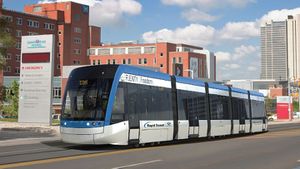Landscape Democracy 2015 Working Group F - Case Study 2
---> back to group page working group F
Light Rail Transit (LRT) in Waterloo Region, Ontario, Canada
| Place name | Waterloo, Kitchener, and Cambridge | |
| Location | Waterloo Region, Ontario | |
| Country | Canada | |
| Author(s) | Arber Krasniqi | |

| ||
|
| ||
Rationale: Why have you chosen this case for the landscape and democracy seminar?
The ongoing light rail transit (LRT) project has been chosen as a case for the landscape and democracy seminar because it plays a crucial role to the future of Waterloo Region and attempts to enhance the quality of local citizens' life. The fundamental goals of LRT project are to move people more efficiently in and around the community, limit urban sprawl, and save farmlands through the protection and preservation of the environment. With the light rail transit, the Region of Waterloo (which includes the City of Waterloo, Kitchener, and Cambridge) saves 500 new lane kilometres of roads over the next 20 years along with 1.4 billion dollars of savings. In other words, without LRT road improvements and expansions in these cities do not offer the same level of development opportunities that light rail transit does.
For all citizens' of Waterloo Region, light rail transit (LRT) will provide plenty of benefits as well as will help the community to preserve a unique quality of life. In suburban areas, development of such a project helps to limit overall traffic congestion and cut-through traffic in existing neighbourhoods; in city centres, creates connected communities; and in rural areas, region's agricultural lands, natural beauty and rural lifestyle will remain preserved.
In conclusion, this case represents a positive approach in terms of landscape and democracy because there is a lot of community engagement and public input of which residents' feedback has played a key role in every LRT decision.
Representation of your observations
- you are basically free to use one or a mix of different presentation techniques
- possibilities are: analytical drawings, graphical representations, collages, video clips, comic/graphic novel, written essay/visual essay
- please add any visual material to the gallery, videos can be placed below, you may add text as you like
- Design Synthesis Drawings
- Yourfilename2.jpg
case representation
- Yourfilename3.jpg
case representation
- Yourfilename4.jpg
case representation
Reflection
What are the major challenges for Light Rail Transit situation?
With respect to landscape and democracy there are not any challenges for light rail transit project. The entire project has been democratically planed since 1976, when it was first presented in the Regional Official Policies Plan. Accordingly, the Region Council had the support from the Province of Ontario and the Government of Canada, following the completion of an extensive public consultation prior to the implementation of the LRT project. Between 2006 and 2011, Regional staff hosted more than 150 public outreach events, and more than 30 public centres were held on which the communities could give their input as well as ask question when needed.
The only challenge that LRT project might face is to fall behind the schedule because the train manufacturer might deliver them late.
What could be a starting point for democractically-based change?
- Please add approx. 150 words for each questions
References
* Please make sure that you give proper references of all external resources used.
* Do not use images of which you do not hold the copyright.
* Please add internet links to other resources if necessary.
About categories: You can add more categories with this tag: "", add your categories
